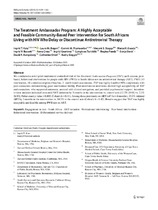The treatment ambassador program: a highly acceptable and feasible community-based peer intervention for South Africans living with HIV who delay or discontinue antiretroviral therapy
Abstract
We conducted a novel pilot randomized controlled trial of the Treatment Ambassador Program (TAP), an 8-session, peerbased, behavioral intervention for people with HIV (PWH) in South Africa not on antiretroviral therapy (ART). PWH (43
intervention, 41 controls) completed baseline, 3- and 6-month assessments. TAP was highly feasible (90% completion), with
peer counselors demonstrating good intervention fdelity. Post-intervention interviews showed high acceptability of TAP
and counselors, who supported autonomy, assisted with clinical navigation, and provided psychosocial support. Intentionto-treat analyses indicated increased ART initiation by 3 months in the intervention vs. control arm (12.2% [5/41] vs. 2.3%
[1/43], Fisher exact p-value=0.105; Cohen’s h=0.41). Among those previously on ART (of for>6 months), 33.3% initiated
ART by 3 months in the intervention vs. 14.3% in the control arm (Cohen’s h=0.45). Results suggest that TAP was highly
acceptable and feasible among PWH not on ART.

